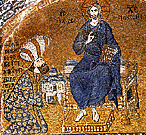 |
|
 |
Theodore Metochites
 heodore
Metochites was one
of the most outstanding Byzantine writers of the 15th century and the greatest heodore
Metochites was one
of the most outstanding Byzantine writers of the 15th century and the greatest
 Byzantine forerunner of the Renaissance. He was born in Nicaea of Bithynia around 1260/1. After completing his enkyklios paideia, at the age of twenty he joined the service of the emperor
Andronikos II Palaiologos in
Constantinople. Having carried out a number of diplomatic missions to Cyprus, Serbia, Thessalonike and elsewhere, he was apppointed to a number of important public posts. He thus successively held the offices of logothetes ton oikiakon, logothetes ton agelon and of paradynasteuon. In 1304 he was appointed to the
highest office in the Byzantine administration, becoming logothetes tou genikou or megas logothetes, a title he held until 1321. Metochites' career was cut short when Andronikos II Palaiologos was deposed, and his disgrace was followed by exile to Didymoteichon when
Andronikos III Palaiologos.
came to the throne. He died in 1332 at his beloved Chora monastery in Constantinople, which he himself had restored and had turned into a place of study and retirement. The oeuvre he left behind is exceptionally rich, including works of rhetoric (royal eulogies and two discourses), two works on astronomy and one "literary testament" in verse. Most important of all, however, are his 20 poems as well as a collection of philosophical texts which he compiled himself in a volume entitled Hypomnematismoi kai semeoses gnomikai ("Annotations and gnomic notes"). The latter collection also contains commentaries on works of Aristotle, which consitute the most extensive commentary on Aristotelian philosophy to have come down to us from the late Byzantine period. Byzantine forerunner of the Renaissance. He was born in Nicaea of Bithynia around 1260/1. After completing his enkyklios paideia, at the age of twenty he joined the service of the emperor
Andronikos II Palaiologos in
Constantinople. Having carried out a number of diplomatic missions to Cyprus, Serbia, Thessalonike and elsewhere, he was apppointed to a number of important public posts. He thus successively held the offices of logothetes ton oikiakon, logothetes ton agelon and of paradynasteuon. In 1304 he was appointed to the
highest office in the Byzantine administration, becoming logothetes tou genikou or megas logothetes, a title he held until 1321. Metochites' career was cut short when Andronikos II Palaiologos was deposed, and his disgrace was followed by exile to Didymoteichon when
Andronikos III Palaiologos.
came to the throne. He died in 1332 at his beloved Chora monastery in Constantinople, which he himself had restored and had turned into a place of study and retirement. The oeuvre he left behind is exceptionally rich, including works of rhetoric (royal eulogies and two discourses), two works on astronomy and one "literary testament" in verse. Most important of all, however, are his 20 poems as well as a collection of philosophical texts which he compiled himself in a volume entitled Hypomnematismoi kai semeoses gnomikai ("Annotations and gnomic notes"). The latter collection also contains commentaries on works of Aristotle, which consitute the most extensive commentary on Aristotelian philosophy to have come down to us from the late Byzantine period.
See also: Education
Chora monastery
|